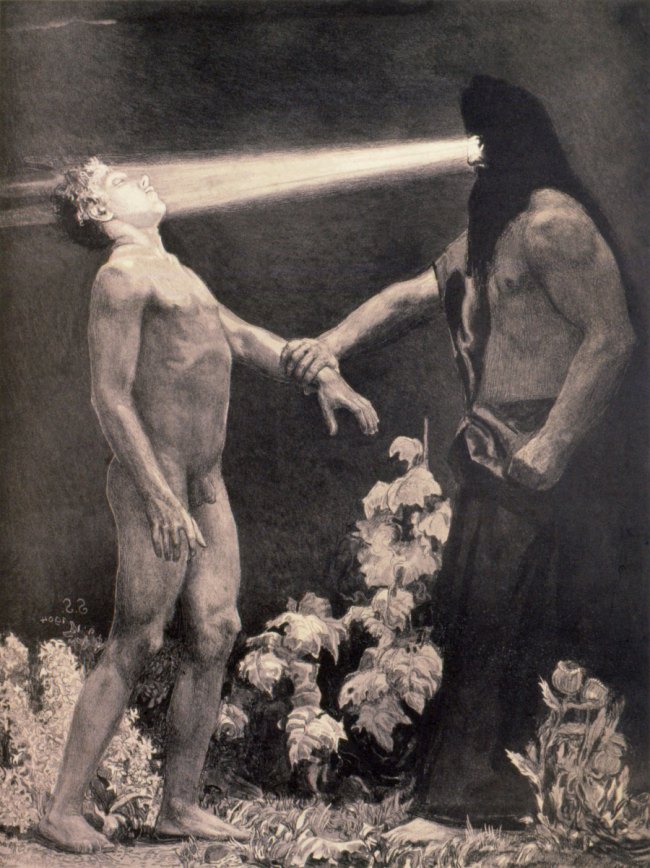billd89 wrote: ↑Wed Jun 09, 2021 10:56 am
2)
De Somniis, 1.215:
δύο γάρ, ὡς ἔοικεν, θεοῦ, ἓν μὲν ὅδε κόσμος, ἐν ᾧ καὶ ἀρχιερεὺς πρωτόγονος αὐτοῦ θεῖος λόγος, ἕτερον δὲ λογικὴ ψυχή, ἧς ἱερεὺς πρὸς ἀλήθειαν ἄνθρωπος, οὗ μίμημα αἰσθητὸν τὰς πατρίους εὐχὰς ·καὶ θυσίας ἐπιτελῶν ἐστιν, ᾧ τὸν εἰρημένον ἐπιτέτραπται χιτῶνα ἐνδύεσθαι, τοῦ παντὸς ἀντίμιμον ὄντα οὐρανοῦ, ἵνα συνιερουργῇ καὶ κόσμος ἀνθρώπῳ καὶ τῷ παντὶ ἄνθρωπος.
See
Yonge's 19th C trans. of 'On Dreams' and then my own adaptation/trans.:
"Apparently there are two temples of God: one is this Cosmos, where His Own First-born Son, Divine Logos, serves as the High Priest. The other is the Rational Soul, the whose Priest is Actualized Man {ἀλήθειαν ανθρωπος: Truth-seeking, insightful man}. The perceptible copy {of the Archetype or Second Son; i.e. human Actualized Man} is not a mimic performing paternal prayers and sacrificial acts, but one allowed to put on the aforesaid tunic/mantle (exact replica of the entire Heaven), so both Cosmos with man and man with the Whole may
synergistically realize a pious discernment and supra-rational accord (accomplishing sacrifices)."
If Cosmos and Psyche are equivalent domains (i.e. Adam Kadmon is 'Second Son'), then Philo's four-stage schema would draw like this:
--- God --- ____________________________ --- World-Soul ---
1. Cosmos. ____________________________1. Psyche (Rational Soul).
2. Logos. _____________________________ 2. Aletheian Anthropos (Noetic Form = Archetype; imperceptible Copy).
3. High Priest. ________________________ 3.
Therapeut (Actualized Man = Teacher).
4. (Pious Religious Devotee.) ____________ 4. (Pious Theosophical Student.)
However,
if Logos and Psyche are the equivalents (i.e. the faculty of Divine Mind), then Philo's four-stage schema should draw like this:
--- God --- ____________________________ --- Wisdom---
1. Cosmos. ____________________________ 1. (World-Soul)
2. Logos. _____________________________ 2. Psyche (Rational Soul).
3. High Priest. _________________________ 3a. Aletheian Anthropos (Noetic Form = Archetype; imperceptible Copy).
______________________________________ 3b.
Therapeut ( = a Divinized Teacher
has become 'Aletheian Anthropos').
4. (Pious Religious Devotee.) _____________ 4. (Pious Theosophical Student.)
I think what Philo means by De Somniis, 1.215 is simpler: Aletheian Anthropos is indwelling the Rational Soul, just as Logos is indwelling the Cosmos. Although these are on different levels & may lack precise symetry, the 'A.A.' (i.e. a divinized man) is able to connect to the higher plane by transcendent Similarity and through his symbolic mantle of Cosmic sympathy. Contemplating the Cosmos is the transcendent paradigm, by synthemata or symbol, here. (Comparing his other works, Philo is inconsistent interpretating the Logos-Anthropos, as
scholars have noted. Perhaps contradictions are explained by different systems, or Philo's own propagandistic revisionism?)
The mundane mimic (i.e. 'religious hypocrite' or unspiritual devotee) merely
performs hollow rituals, whereas (the Copy of) Aletheian Man - a holy man, call him a Therapeut? -
accomplishes sacrifices through Cosmic Sympathy. Yonge and Colson's simplistic translation (
συνιερουργῇ = "join") might imply a correspondent shift - that the Man-Subject removes to a different Place-Object (Cosmos as
topos). From the metaphysical terminology, transposition/translation is likely but NOT yet evident. The key term is
synierourgē which has multiple mystical meanings, yet the translators' simple verb "join" doesnt adequately convey the truth of what's happening here.
συνίημι = to discern one another, to bring together, to bring to mutual understanding, to act in pious accord.
Synesis is a complex mental faculty: a judgmental harmony.
συνιερουργῇ = synergistically consecrating a supra-rational accord. (Also check
Syneidēsis: Cosmic Consciousness.)
